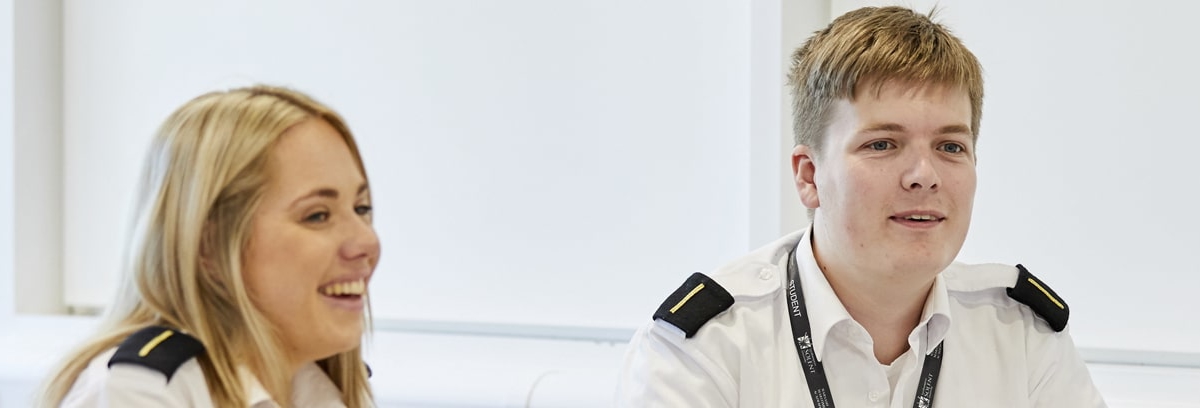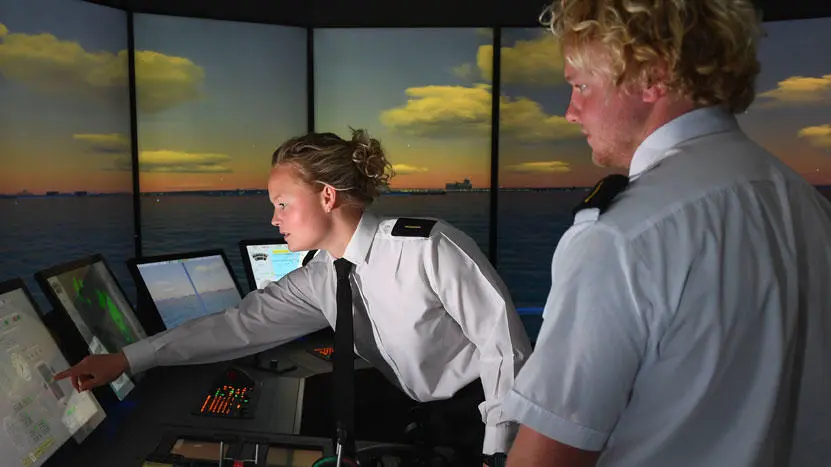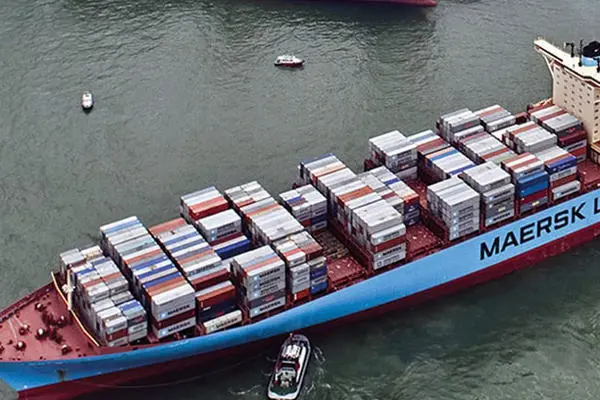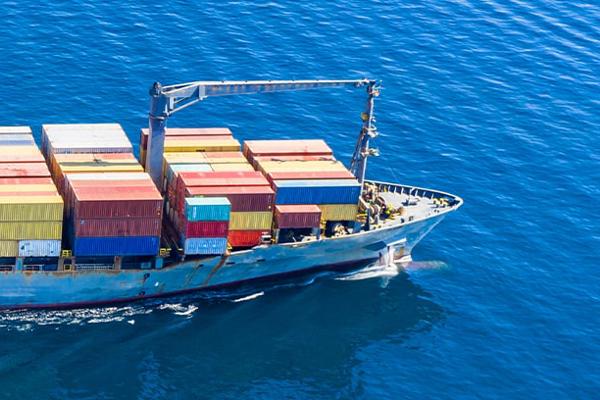
MSc Shipping Operations
Is it time to take your maritime career to the next level? This two year distance learning programme is ideally suited to maritime professionals who are hoping to move into...
Find out more
Start your maritime career in one of the UK’s busiest ports, at training facilities that are among the best in the world – combining the hands-on training of a cadetship with a full academic degree.
Contact international admissions
Email: Call:Fully sponsored by one of a huge range of shipping and maritime companies, and developed to meet the specific needs of the shipping industry and the Merchant Navy Training Board, your degree cadetship combines rigorous academic study in Southampton – one of the UK’s busiest ports – with extensive practical training at sea.
Shipping out as a deck officer cadet on a range of vessels owned or operated by your sponsoring company, you will develop the essential skills, knowledge and behaviours needed to become a deck officer in the Merchant Navy. As well as developing your personal, interpersonal and leadership skills, you'll learn to work competently and responsibly as an individual and as part of a team.
Using theoretical knowledge, practical experience and professional skills and judgement informed by study and experience in the workplace, you'll gain a strong understanding of the fundamental principles and interrelationships of the three main shipboard functional areas – navigation, shipboard operations, and management – and learn to anticipate, identify and generate timely and workable solutions to a wide range of problems and issues.
As part of your degree cadetship, you'll gain your first qualification as an Officer of the Watch (OOW) and be equipped with all the knowledge and understanding you need to undertake tasks as detailed in the industry-based onboard training – and with academic exemptions for further professional qualifications under the internationally recognised Standards of Training, Certification and Watchkeeping (STCW) and UK Maritime and Coastguard Agency (MCA) regulations.
And with a full academic honours degree, you will also be well placed for a range of senior, shoreside and management roles later in your career – making this the perfect course for a long and lasting career in maritime command.
This programme is aligned to the new UK-wide maritime officer cadetship syllabus developed by the Cadet Training and Modernisation (CT&M) Programme, led by the Maritime and Coastguard Agency (MCA). Effective from September 2025, the new syllabus reflects the current practices and technology used aboard modern vessels and supports the development of 'human element' skills - essential learning for today’s aspiring officers.
This course is part of the South Coast Institute of Technology (IoT), a partnership of colleges, universities and industry-leading employers to create new career opportunities in the technology sector. IoT courses like this one are precisely tailored to the needs of employers in the maritime, engineering and digital industries – industries which are hungry for talented new engineers, technologists, technicians and creatives like you.
Part of:

This course is for students who want to achieve a higher level academic qualification while training for a professional qualification in nautical science.
This exciting course will allow you to gain your first qualification as an Officer of the Watch, opening up a wide range of opportunities within maritime command. With additional study and sailing experience you can take your career further, rising through the ranks to Captain.
The University cannot guarantee any particular members of staff will teach specific aspects of the course in the future, but will endeavour to ensure the teaching team maintains their balance of experience and qualifications.
Warsash Maritime School has a full range of industry-leading training facilities including bridge simulators and ECDIS suites where deck cadets can learn and develop their passage planning skills and navigate ships in an environment that closely resembles the equipment and layouts found on a modern ship’s bridge. Practical maritime safety training takes place at our Warsash campus at our fire training ground, medical training centre, and pier head.
Away from studying, why not try out the gyms, fitness studios and sports halls in our £28 million Sports Complex, or watch a blockbuster film at our student-run cinema with Dolby Atmos audio.
In this module, you'll learn how to determine the vessel’s position through observation of celestial bodies, and to calculate the course and shortest possible distance between positions on the earth’s surface to enable you to navigate the vessel safely when out of sight of land and without the use of electronic position fixing systems. You'll also learn how to evaluate the accuracy of gyro and magnetic compasses using celestial bodies, and to demonstrate the use and maintenance of relevant precision navigational instruments.
During this module, you'll gain an understanding of how merchant ships generate revenue by safely and efficiently carrying cargo. This includes the proper loading, stowage and carriage of dry bulk, liquid, and chemical cargoes, as well as the legal aspects of cargo operations. The knowledge gained here will enable you to apply the law to other operational modules on this cadetship programme.
This module will provide you with an understanding of the meteorological observation methods, use of meteorological instruments and world meteorological organisation (WMO) codes, and the weather services available to shipping. In addition, you'll learn about meteorological processes and to be able to describe the weather associated with the main features of a synoptic chart, the general circulation of the atmosphere, the main climatic zones over the oceans, and the ocean currents of the world.
This module will provide you with the knowledge and skills to carry out the safe navigation of a ship from a ship’s bridge. You'll learn about modern navigation systems, manoeuvring the vessel using modern engineering systems, the preparations to deal with various emergencies at sea, and the use of IMO approved communication systems and procedures.
This module will familiarise you with the relationship between laws, codes, and various forms of guidance related to ship and crew safety, as well as operational procedures. You'll gain an understanding of the laws governing the shipping industry, both nationally and internationally, and an insight into the organisational structures used by your company, both ashore and onboard. Additionally, you'll explore the factors that can influence decision-making, such as stress, fatigue, culture, and situational awareness, and learn techniques to mitigate these influences.
This module will familiarise you a typical ship’s structure and the salient features of a range of ship vessel types, in addition to applying the principles of ship stability to box- and ship-shaped vessels in routine situations.
This module will familiarise you with the methods of planning a safe passage and determining a ships position using appropriate charts and publications to maintain the navigational safety of a merchant vessel.
During this module, you'll learn to understand and analyse the electronic weather reports available on a ship and to compare synoptic charts and actual weather conditions experienced by the vessel. This includes an awareness of the use of data science in weather forecasting and modelling.
This module builds on the operational level module and deals with the management of navigation of a ship from a ship’s bridge. You'll enhance your navigation and ship handling skills using modern navigation systems as well as engineering systems. You'll also learn to be prepared to deal with various emergencies at sea as a ship’s captain, the sole person in charge of lives and property at sea.
Building on knowledge gained in the operational module in year one, you'll learn to evaluate a completed passage plan considering all factors that may affect the safety of navigation, and to implement and monitor appropriate solutions for situations which arise during a passage.
This module builds on your knowledge of operational requirements for different ship types and will improve your understanding of the planning and cargo operational procedures for all dry, oil, liquid gas and chemical cargoes at the management level. Cargo operations earns revenue for the ship owners, so as managers of all the operations on board ship, including cargo operations, it is the responsibility of deck officers to ensure the cargo operation is carried out both safely and efficiently. This module will enable deck officers to prepare viable plans and understand how to manage cargo operations.
In this module you'll learn to define engineering terms, describe the operating principles of marine power plants, the function and operation of a vessel’s auxiliary machinery, and the concepts of control systems. The advanced ship construction teaching and learning embedded in this module will help prepare you to manage ship maintenance, survey and repair activities.
This module covers advanced and specialist ship stability theory and its application aboard merchant vessels. As the module progresses, you'll learn to determine whether a ship is stable and therefore safe to sail using a combination of metrics and you'll acquire knowledge and skills to be able to efficiently improve a vessel’s stability without having to rely on computer algorithms and a process of trial and error.
This module will allow you to analyse shipboard management and safety management systems, including the management of personnel, operations and resources on board, in accordance with current legislative requirements. You'll analyse the role of the senior officer with regard to health and safety, budgeting, employment law, and management of shipboard resources.
During this module, you'll learn about key management principles and become familiar with the most important international conventions. The module focuses on essential knowledge relating to maritime law and management to help prepare you to be effective in a management role on board a merchant vessel.
In this module you'll bring together the skills and knowledge gained throughout your course, both in the classroom and at sea. You'll have the opportunity to choose a topic that excites you and to undertake a piece of in-depth research and analysis. The aim is to demonstrate your best work and to highlight your knowledge of your chosen topic.
This module will enable you to understand how effective and efficient people management adds to a company’s success. The module analyses the integrated nature of people management and how this is achieved through a range of management tools and techniques, and identifies current themes and issues that relate to managing people from the perspective of the line manager in an organisation.
The module focuses on the process of statutory surveys and inspections, and the investigation of potential breaches of statutory requirements resulting in damage and loss. During the module, you'll explore the role of investigators appointed by maritime certifying authorities, government maritime accident investigation agencies, shipping companies, and protection and indemnity (P&I) insurers.
Throughout your cadetship, you will have started to develop a much greater understanding of the commercial elements of the industry such as chartering and brokering and the relationships between the many agencies and businesses involved in the maritime world. This module will examine some of the key global business factors you'll need to identify and evaluate to support your decision-making processes. You'll also develop knowledge of management, and the processes involved making commercially appropriate strategic management decisions.
During this module, you'll develop the skills in leadership and management needed to sustainably manage business activity and projects. The module begins by focusing on developing your understanding of sustainability and addresses the development of sustainability, its contested nature and interdisciplinary application. The module then moves on to discuss the concepts of ESG (environmental, social, and governance) and their application to the industry, followed by a consideration of the tools and technology available to meet the needs of industry in reaching a more sustainable future.
Contact international admissions
Email: Call:Solent’s curriculum framework builds on our unique, creative and applied approach to teaching. The transformation of students’ lives is at the heart of our mission as a university, and our curriculum – informed by the latest theory – reflects this shared educational vision.
Find out more
The student achievement team are on hand to help you succeed during your studies at Solent. They aim to contact you at key times during your time here with personalised information, advice and guidance, by email or phone.
The disability advice team provides information, advice and guidance for disabled students.
All students can access Succeed@Solent, Solent's online guide to getting better grades. It offers extensive, practical information and advice on topics such as academic writing, research and presentations.
Maritime and shipping is a huge, thriving industry – the backbone of international trade, and a fundamental part of modern global commerce. As a ship’s officer you will be a key part of this, keeping vessels of all kinds, from tankers to container ships – or even ferries, cruise liners or superyachts – running effectively, efficiently and safely.
Under the captain’s management, the deck department is responsible for the safe navigation and operation of the vessel, both at sea and in port.
Deck officers are a vital part of the on-board management team, taking charge of an expensive vessel and its equally valuable crew, guests, or cargo. You will take key decisions on manoeuvring the vessel and controlling its navigation, communications and security.
Numerous opportunities also exist for qualified navigation officers ashore. Shipping companies often recruit shore based marine superintendents and fleet operations staff from their seagoing officers. Harbour authorities recruit experienced officers to train as pilots, harbour masters and port operations managers.

The Solent Careers team is committed to getting students into great careers.
While you are studying, the team can help you with finding work experience or placements, link you with a mentor, check your CV, or offer one-to-one guidance.
We also have graduate job opportunities just for Solent graduates.

6th
UK uni for sustained employment
Longitudinal Educational Outcomes, 2022
Every student at Solent University will also have the option to study an additional Certificate in Practical Artificial Intelligence qualification alongside their course. Free of charge, the course ensures you'll be prepared for a fantastic and varied career after graduation.

Thinking about studying further than an undergraduate degree? Alumni can get 20% off their postgraduate study.

Is it time to take your maritime career to the next level? This two year distance learning programme is ideally suited to maritime professionals who are hoping to move into...
Find out more
Get a head start in the exciting, global industry of shipping and logistics - gain the skills and knowledge sought after by employers.
Find out more
Expand your knowledge of maritime business to graduate well-equipped for an international career in chartering, trading, ship management.
Find out moreOfficer cadet training is fully sponsored by shipping companies.
For further information, please visit our tuition fees page.
While most course costs are covered by your tuition fees, some essential resources and optional extras may need to be paid for separately. For advice on budgeting and managing your money, please contact student.funding@solent.ac.uk.
Solent University offers a range of bursaries and scholarships that provide financial assistance or waive fees for tuition or accommodation. Each bursary or scholarship has specific eligibility criteria. Check out our bursaries and scholarships pages to find out more.
Cost of living support
At Solent, we understand that the cost of living crisis may be of some concern. To help, we've put together some detailed information to show what support is available and how to make your money go further.
Graduation costs
There is no charge to attend graduation, but you will be required to pay for the rental of your academic gown (approximately £45 per graduate, depending on your award). You may also wish to purchase official photography packages, which range in price from £15 to £200+. Graduation is not compulsory, so if you prefer to have your award sent to you, there is no cost. Extra guest tickets will go on sale after results publication and will be sold on a first-come-first-served basis. The cost per ticket is currently £20. Please note, we do not guarantee there will be any extra tickets available to purchase.
Contact international admissions
Email: Call:Please select an option below:
As a general guide, we look for qualifications that are equivalent to the British high school A-levels.
British shipping companies will normally accept applications from candidates from the EU. Candidates should apply directly to the shipping companies for sponsorship.
For further information about UK, EU and international qualifications, please see our course entry requirements document.
As a general guide, we look for qualifications that are equivalent to the British high school A-levels. However, MCA certificates of competency may be awarded to people of any nationality and the training programmes are open to all.
British shipping companies will normally only recruit UK or European Union nationals. If you're a potential international candidate from outside the UK and EU, you should research shipping companies from your own country (that are approved by the MCA) to secure sponsorship.
All international applicants need to be aware that the English language requirements to attend Solent University, and the English language requirements to obtain a visa from the Home Office, may be different. This means that if you meet the Solent University language requirement to gain a place on the course, you may still have to meet additional requirements to be granted with a visa by the Home Office.
We strongly advise all applicants to visit the Home Office website which outlines all the requirements for a successful visa application.
To apply for this course, you must meet the academic entry requirements as stated.
The next step is to find a company to sponsor you so you can complete the sea service elements of the training programme. You should apply direct to the sponsoring companies for details of their recruitment policies and the availability of sponsorship.
There are a number of UK sponsoring companies that recruit UK nationals as officer cadets to work in the various shipping sectors of the Merchant Navy (for example, cargo, container, cruise, tanker etc.), either individual shipping companies recruiting to fulfil their own staffing needs or training organisations that recruit on behalf of their clients.
Companies normally start the recruitment process around January each year for entry in the following September or April.
Applicants who do not have English as their first language will be required to demonstrate an approved level of proficiency in the use of the English language. The agreed minimum requirements for this course are:
TOEFL IBT tests taken prior to 21 January 2026
TOEFL IBT tests taken from 21 January 2026
Qualifications are checked before enrolment, and international students must bring their original certificates or certified copies when coming to study at the University.
Pre-Sessional English programme
The University also offers a pre-sessional English programme for international students who wish to improve their level of English before starting a degree course.
Contact international admissions
Email: Call: